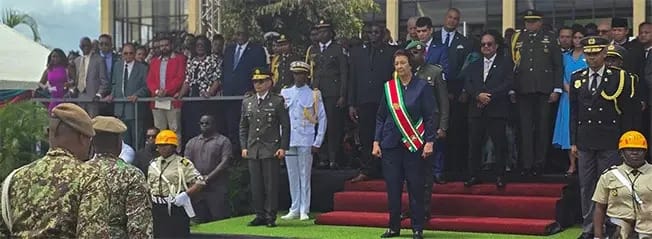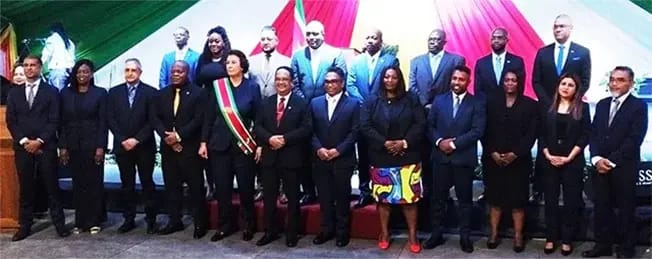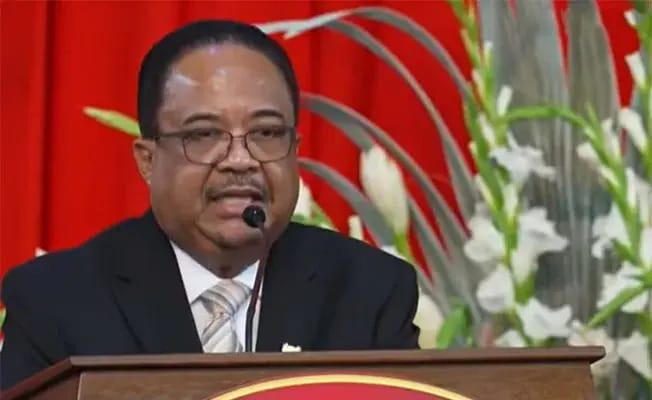- De Brief
- Posts
- The President and Vice President call for unity at the inauguration
The President and Vice President call for unity at the inauguration
Geerlings-Simons and Rusland call for unity at the inauguration but also caution that times ahead will be difficult for the country.
Happy Monday!
This week, we cover the plans outlined by the incoming President Jennifer Geerlings-Simons. We also cover speeches given by the President and Vice President at the inauguration ceremony.
President Jenny Geerlings-Simons outlined her approach to governing for the future.

President Geerlings-Simons being inaugurated.
President Jenny Geerlings-Simons has emphasized a balanced approach to economic policy, ensuring fiscal discipline while allowing room for productive investment. She made it clear that the government will not spend money it doesn't have, but acknowledges the need for certain essential expenditures due to a weakened economy.
The government will have to approve the 2025 budget followed by the 2026 budget. While some deficit spending may be acceptable in anticipation of revenues, this cannot become a long-term practice to avoid increasing national debt.
Simons stressed the importance of protecting vulnerable groups, especially children, and warned that broader society may need to make sacrifices. Revenue growth in the Simons government will focus on tax reform and targeting untapped resources.
She supports continued cooperation with the IMF, but opposes repeating the austerity-focused approach of the previous administration. She insists that any program must strengthen institutions without harming citizens.
On the transition of power from the Santokhi government, Simons called for a more structured legal framework. Despite some meetings between outgoing and incoming officials, the process has been hasty.
The President outlined that the hard work is set to begin after the inauguration.

During a festive reception at the presidential palace following her inauguration, President Jenny Geerlings-Simons emphasized that the celebrations would be followed by hard work.
She acknowledged that while Suriname seems to be poor, there is wealth in the country, and she called on the private sector, large companies, and civil society to help ensure minimum living standards for all citizens.
Simons addressed the youth, urging them to commit to working toward developing a better future with the country’s resources. Simons stressed that change is possible if there is collective will and that this transformation must happen together with the people, not just the government.
To support this, she announced the creation of institutions for structured public communication, ensuring transparency about progress, challenges, and solutions. She reiterated that poverty and lack of education for children would not be tolerated, as these threaten the nation’s future.
The President and Vice President, in their inaugural address, addressed the heavy responsibility that they have coming into this process.
President Jenny Geerlings-Simons, in her inaugural address, acknowledged the heavy responsibility of her new role and the added expectations as Suriname’s first female president. She emphasized unity, national healing, and the need for collective action to bring about meaningful change.
Simons committed to economic recovery and growth, focusing on key sectors like healthcare, education, agriculture, and tourism to reduce dependence on mining and diversify the economy. She warned against the unequal distribution of wealth from the emerging oil and gas industry, insisting that all Surinamese must benefit.
She stressed that wellbeing goes beyond money, placing people and human dignity at the center of her vision. The president also announced plans for government decentralization and called for openness, solidarity, and shared responsibility.
Simons concluded with a call for national unity, quoting Surinamese poets:
“I would like to bind you into one people, without it remaining a fairytale.”
The Vice President’s messaging was similarly focused on uniting the country.

Incoming Vice President Gregory Rusland, in his inaugural address, presented himself as a humble servant of the people, committed to dedication, integrity, and service. He acknowledged the challenges of his role and expressed deep appreciation for the resilience of the Surinamese people.
Rusland pledged to act as a bridge-builder—between government and society, across political lines, and between present and future. He emphasized that Suriname’s strength lies in its people, not just in its natural resources.
He called for transparency, institutional reform, inclusion, and unity, and warned against waste and division. His vision includes a Suriname where youth can dream again and where education, healthcare, and justice are accessible to all.
He concluded by asking for wisdom and cooperation, and expressed hope for a peaceful and dignified future for the nation.
The new Royalties for Everyone (RVI) project is immediately under scrutiny by the incoming government.
President Jenny Geerlings-Simons announced that the new government will seek clarity on the Royalties for Everyone (RVI) project launched by the previous Santokhi administration.
She admitted not fully understanding the project's structure or funding and emphasized that Suriname currently has no oil royalties to spend.
Simons stated that future oil revenues must be used for essential services like education, healthcare, and social support.
The RVI project promises eligible Surinamese citizens born before 2025 a share of future royalties, with a $750 investment and monthly interest payments over 10 years. Vulnerable groups can opt for immediate full payouts.
The NDP, led by Simons, criticized the project as misleading and lacking real benefits for citizens. It was also revealed that some banks refused to participate, citing the absence of a legal framework. Simons said a decision on the project's future will follow once full information is available.